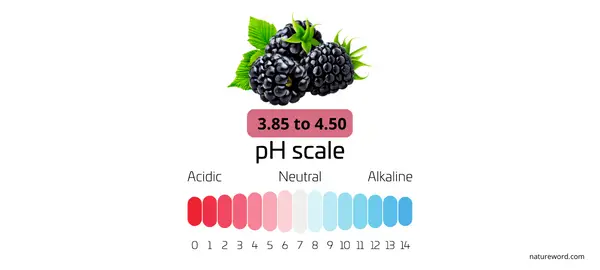Are blackberries acidic or alkaline? This is a question that many people are wondering about these days. The answer may surprise you!
Blackberries are actually pretty acidic, but they offer a variety of nutritional benefits. Blackberries can help to boost the immune system, improve heart health, and even reduce inflammation.
Let’s take a closer look at the truth about blackberries and their effect on the body!
What Are Blackberries, and Where Do They Come From?
Blackberries are a kind of fruit that are dark in color and have a tart flavor. Blackberries grow on bushes and are usually found in woods or hedges. The berries are ripe when they are black and soft to the touch.
Blackberries are a good source of Vitamin C and fiber. They can be eaten fresh, or they can be frozen for later use. Blackberries grow in many parts of the world, including North America, Europe, Asia, and Africa.
In some parts of the world, blackberries are considered an invasive species. This is because they can easily take over an area and crowd out other plants.
Blackberries can also be a problem for farmers because they can damage crops.
Are Blackberries Acidic or Alkaline, and What Effect Does This Have on the Body?

While they are enjoyed for their sweet flavor, many people may not realize that blackberries are pretty acidic.
The pH of blackberries falls in the range of 3.85 to 4.50, making them one of the more acidic fruits. This acidity can have a number of effects on the body. For example, acidic foods can cause teeth to become more sensitive and susceptible to cavities. In addition, acidic foods can also lead to heartburn and indigestion.
However, blackberries are also a good source of vitamins and minerals, so they can still be part of a healthy diet. It is extremely important to be aware of their acidity level and how it may affect the body.
What Foods with High Acidity Do to the Body?
Acidic foods can have a number of adverse effects on the body. In addition to causing cavities and tooth sensitivity, they can also lead to heartburn, indigestion, and stomach ulcers. Acidic foods can also cause the body to leach calcium from the bones, which can lead to osteoporosis.
In addition, consuming too much acid can upset the body’s pH balance, which can lead to a number of health problems. Therefore, it is important to monitor your intake of acidic foods and to focus on eating more alkaline foods.
Some of the Nutritional Benefits of Blackberries
Despite their acidic nature, blackberries offer a variety of nutritional benefits, including:
Low Caloric Density
When trying to maintain a healthy weight, it is important to pay attention to the caloric density of the foods you are consuming. Foods with a high caloric density, such as cheeseburgers and cake, pack a lot of calories into a small amount of food.
This can lead to weight gain, even if you are eating relatively few calories overall. On the other hand, foods with a low caloric density, such as vegetables and fruits, have fewer calories per bite. This means that you can eat a higher quantity of food without consuming as many calories.
Blackberries are a perfect example of a low-calorie food: just one cup of blackberries contains only 62 calories. So if you are looking to significantly reduce your calories without feeling hungry all the time, blackberries are a great option.
Manganese
Manganese is a mineral that can be found in blackberries. It is important for the development of strong bones and connective tissue. Manganese also helps the body to produce energy and aids in the metabolism of carbohydrates and fat.
Although it is not as well-known as some other minerals, manganese is essential for good health. A diet that includes blackberries can help to ensure that you are getting enough manganese. In addition to being an excellent source of this important nutrient, blackberries are also low in calories and high in fiber. As part of a healthy diet, they can help you to reach your goals for weight loss or maintenance.
Vitamin K
Vitamin K is a nutrient that is essential for blood clotting. It helps to prevent excessive bleeding, both internally and externally. Vitamin K is found in tons of leafy green vegetables, such as kale and spinach, but it can also be found in blackberries.
How Blackberries Help to Improve Heart Health and Boost the Immune System
Blackberries have many properties that help to improve heart health and boost the immune system, including:
Fiber
Blackberries are a good source of fiber, with each cup containing about seven grams. Fiber is important for heart health because it helps to lower cholesterol levels and keep the arteries clear. Fiber is also beneficial for the immune system because it helps to remove toxins from the body.
Antioxidants
Blackberries are also rich in antioxidants, which are substances that help to protect the cells from damage. Antioxidants have been shown to reduce the risk of heart disease and cancer. They can also help to boost the immune system by reducing inflammation.
Vitamin C
Blackberries are an excellent source of vitamin C, with one cup providing about half of the recommended daily intake. Vitamin C is vital for the function of the immune system because it helps the body to produce antibodies, which fight off infection. Vitamin C is also beneficial for heart health because it helps to reduce inflammation and prevent the development of atherosclerosis, which is a condition that leads to the hardening of arteries.
To Close
Blackberries are a highly acidic fruit. They are also extremely nutrient-rich and provide many health benefits. Blackberries are lower in calories and high in fiber, antioxidants, vitamin C, and manganese. These nutrients help to improve heart health and boost the immune system. When incorporating blackberries into your diet, be sure to eat them in moderation and pair them with alkalizing foods to maintain a healthy pH balance.
